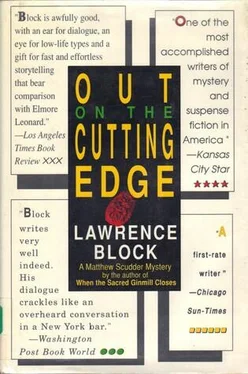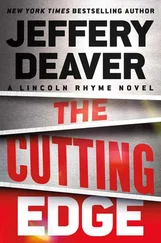When she came back she said, “I can still smell it.”
“It’s not in the room, it’s in your lungs. It’ll take a while to get rid of it. But the windows are open up there and the apartment’ll air out fast enough.”
“It doesn’t matter. He won’t let me rent it.”
“Another one for him to warehouse?”
“I expect so. I’ll have to call him later, tell him he lost a tenant.” She gripped the base of the bottle with one hand, spun the oversize cap with the other. There were no rings on her fingers, no polish on her nails. She wore a digital watch with a black plastic strap. Her fingernails were clipped short, and one thumbnail showed a white spot near the base.
She said, “How long has it been since they took the body out? Half an hour? Any minute now there’ll be somebody ringing my bell, asking if his apartment’s available. People are like vultures in this town.” She poured a little whiskey into her glass and Fred Flintstone grinned his silly grin. “I’ll just say it’s rented.”
“And meanwhile people sleep in the subway stations.”
“And on park benches, but it’s getting too cold for that now. I know, I see them all over, Manhattan’s starting to look like a Third World country. But the people on the streets couldn’t rent one of these apartments. They haven’t got a thousand a month.”
“And yet the ones who do get city housing wind up costing more than that. The city pays something like fifty dollars a night to house people in single rooms in welfare hotels.”
“I know, and they’re filthy and dangerous. The welfare hotels, I mean. Not the people.” She sipped her drink. “Maybe the people, too. As far as that goes.”
“Maybe.”
“Filthy and dangerous people,” she sang tunelessly, “ in filthy and dangerous rooms . Now there’s an urban folk song for the Eighties.” She put both hands behind her head and fiddled with the rubber band that was holding her hair in place. Once again her breasts pushed against the front of her shirt, and again I was drawn to them. She unfastened the rubber band, combed her hair with her fingers, gave her head a shake. Loose, her hair fell past her shoulders and framed her face, softening its lines. Her hair was several different shades of blond, ranging from very light tones to a medium brown.
She said, “The whole thing is crazy. The whole system is rotten. That’s what we used to say, and it looks as though we were right all along. About the problem, if not about the solution.”
“We?”
“Hell, yes, all two dozen of us. Christ.”
She was, it turned out, a woman with a past. Twenty years ago she’d been a college kid in Chicago for the Democratic Convention. She’d lost two teeth to a police baton when Daley’s cops lost it and rioted. Already radicalized, the incident propelled her into an SDS offshoot, the Progressive Communist Party.
“In all innocence,” she said, “we wound up with the same initials as angel dust. Of course this was twenty years ago and dust didn’t amount to much, but then neither did we. Our total membership never exceeded thirty. And we were going to start a revolution, we were going to turn the country around. Government ownership of the means of production, complete elimination of class lines, an end to discrimination on the basis of age or sex or color — the thirty of us were going to lead the rest of the country to heaven. I think we really believed it, too.”
She gave the movement years of her life. She would move to some city or town, get a job waitressing or working in a factory, and do whatever she was ordered to do. “The orders didn’t necessarily make sense, but unquestioning obedience to party discipline was part of the deal. You weren’t supposed to notice if the instructions made sense or not. Sometimes two of us would be ordered to move to Dipshit, Alabama, and rent a house and live as man and wife. So two days later I’d be shacked up in a trailer with somebody I barely knew, sleeping with him and fighting about who’d do the dishes. I’d say he was trapped in his old sexist roles if he expected me to do all the housework, and he’d remind me that we were supposed to blend in with our surroundings, and how many househusbands with elevated consciousness were you going to find in your average redneck trailer park? And then two months later, when we’d just about got it worked out, they’d send him to Gary, Indiana, and me to Oklahoma City.”
Sometimes she was ordered to talk to fellow workers with the goal of recruiting new members. A few times she’d performed unfathomable acts of industrial sabotage. Often she went someplace to await further instructions, and no instructions came; finally she’d be moved somewhere else, and told to wait some more.
“I can’t really convey what it was like,” she said. “Maybe I should say that I can’t really remember what it was like. The party became your whole life. You were isolated from everything else because you were living a lie, so you never got past the surface stage in relationships outside the party. Friends and neighbors and fellow workers were just part of the scenery, props and stage dressing in the false front you were presenting to the world. Besides, they were just pawns in the great chess game of history. They didn’t know what was really going on. That was the heady part, the drug — you got to believe that your life was more significant than other people’s.”
Five years ago she’d begun to get profoundly disillusioned, but it took a while before she was ready to write off such a big portion of her life. It was like a poker game — you were reluctant to fold a hand when you already had so much invested in it. She fell in love finally with someone who was not in or of the movement, and defied party discipline by marrying him.
They moved to New Mexico, where the marriage fell apart. “I realized the marriage was just a way out of the PCP,” she said. “If that’s what it took, so be it. You know what they say about ill winds. I got a divorce. I moved here. I became a super because I couldn’t figure out how else to get my hands on an apartment. How about you?”
“What about me?”
“How’d you get here? And where is it you’ve got to?”
I’d been asking myself the same goddamned questions for years.
“I was a cop for a long time,” I said.
“How long?”
“Close to fifteen years. I had a wife and kids, I lived in Syosset. That’s on Long Island.”
“I know where it is.”
“I don’t know that you could say I got disillusioned. One way or another the life stopped suiting me. I quit the police force and I moved out, got a room on Fifty-seventh Street. I’m still there.”
“A rooming house?”
“A little better than that. The Northwestern Hotel.”
“You’re either rich or rent-controlled.”
“I’m not rich.”
“You live alone?” I nodded. “Still married?”
“The divorce went through a long time ago.”
She leaned forward and put a hand on top of mine. Her breath was richly seasoned with scotch. I wasn’t sure I liked smelling it that way, but it was a lot easier to take than the smell in Eddie’s apartment.
She said, “Well, what do you think?”
“About what?”
“We looked on death side by side. We told each other the story of our lives. We can’t get drunk together because only one of us is drinking. You live alone. Are you involved with anybody?”
I had a sudden sense-memory of sitting on the sofa in Jan’s loft on Lispenard Street, with Vivaldi chamber music playing and the smell of coffee brewing.
“No,” I said. “I’m not.”
Her hand pressed down on mine. “Well, what do you think, Matt? Do you want to fuck?”
Читать дальше












